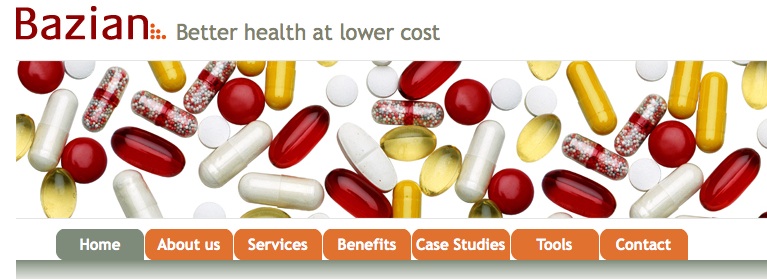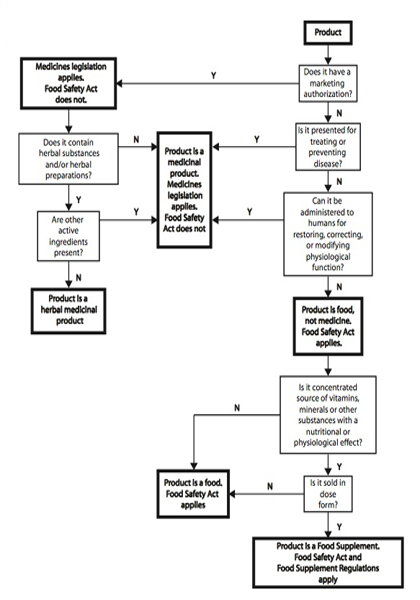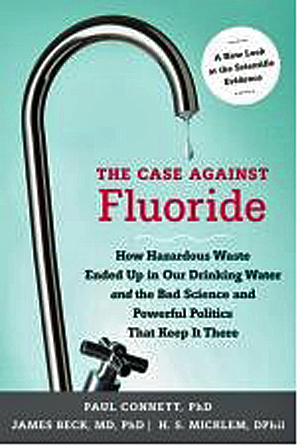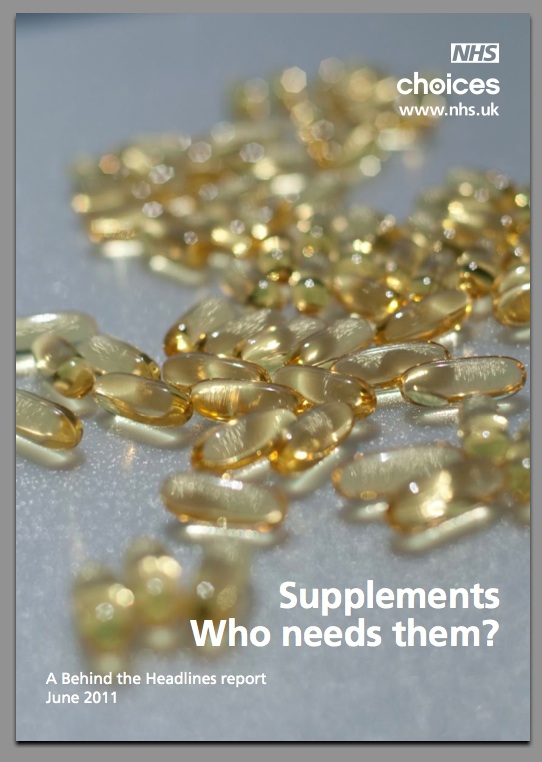KEY POINTS
- The UK National Health Service (NHS) recently published a report entitled Supplements: who needs them?
- This report was highly biased against food supplementation, using discredited science to make its case
- Its recommendations closely reflect the goals of European Union legislation on food supplements
- As such, it can be considered a means of conditioning the UK public to accept the new legislative regime
- The company commissioned to co-author the report has a history of developing similarly biased reports against the public’s interests
The UK’s National Health Service (NHS) is, once again, in the midst of politically motivated reform and restructuring. On 31st May 2011, the NHS published a document entitled Supplements: who needs them? A special report. Promising to, “Make sense of some of the issues surrounding [food supplements], and look at a selection of the evidence on some of the most popular supplements in use today”, the report actually signals the official NHS adoption of the European Union (EU) view of food supplements: a ‘reform’ that has not been trumpeted by anyone within or outside government. Researched and written by Bazian Ltd. – a company with significant links to stories covered in the past by ANH-Intl – the report is a tissue of half-truths, distortions and omissions that seeks to condition the UK public to accept the effects of several strands of EU legislation as being ‘evidence based’.

Bazian Ltd. - a company with dubious links
Scope of the report
The report sets out to look at the evidence supporting the use of all types of food supplements, including vitamin supplements and supplements specifically for colds, herbal supplements, fish oils and body-building supplements. “The claims the media makes [about supplements] aren’t always supported by the underlying research”, the authors go on – only too true, in our opinion – but they promise us faithfully that they have, “Consulted some of the most robust evidence on some big-selling supplements to help consumers make their own minds up”. However, “While this report is not based on our own systematic searches” because it would take too long, the authors assure us that they have searched for high-quality evidence in the Cochrane Library.
On page 5, there is a helpful diagram showing how supplements of all types are regulated in the UK, which gives a greatly simplified picture of how the Human Medicinal Products Directive (HMPD; Directive 2001/83/EC), the Traditional Herbal Medicinal Products Directive (THMPD; 2004/24/EC) and the Food Supplements Directive (FSD; 2002/46/EC) operate. None of this legislation is named or even referred to, however, the report preferring the vague term “medicines legislation” along with the Food Safety Act and Food Supplement Regulations – both of which are based on EU laws. The diagram serves as a reminder to anyone who may have been in doubt, all herbal medicines must now be registered under the EU Herbal Directive, or they are illegal. That’s precisely our concern, when it’s so difficult to get a diverse range of polyherbal products, as are common in long-standing, non-European, traditional healthcare systems, through the Herbal Directive’s front door.

Flow diagram (from report, p.5) showing how natural products are classified according to European and UK national laws
A thumbs-up for the EU health claims regime
Page 7 covers the health claims that can be made about their products by manufacturers, nowadays governed by the Nutrition and Health Claims Regulation (NHCR; No. 1924/2006). The NHS/Bazian report is entirely positive about what amounts to the gravest-ever threat mounted against free speech in natural healthcare within Europe – indeed, in any field. The report’s authors contest that consumers are being “taken for a ride” by supplement health claims, although the most authoritative source they could find is UK consumer magazine, Which?. The report notes approvingly that, “The European Food Safety Authority has looked at the science behind the health claims of thousands of different supplements [and]…it has turned down roughly 80% of these claims”, without looking into any of EFSA’s grounds for rejection or its terms of reference.
NHS (actually the EU): virtually no-one needs vitamin supplements!
On page 4, under the heading Should we be taking supplements?, the authors rightfully state, “There is not a straightforward yes or no answer to this question”, before continuing, “Experts agree that most people can get enough of these nutrients from eating a balanced diet and, in the case of vitamin D, from getting enough sunlight.” No actual ‘experts’ are quoted or any references made to their work, but looking at EU Directive 2002/46/EC, the Food Supplements Directive, we find the following text in Paragraph 3 of the preamble: “An adequate and varied diet could, under normal circumstances, provide all necessary nutrients for normal development and maintenance of a healthy life.” Spot the difference! It’s also interesting that they fail to ask any of the medical doctors or qualified nutritionists who have worked with supplements for decades and dealt with health turn-arounds in complex conditions that general practitioners armed only with pharmaceutical drugs can only dream about.

Should we be taking supplements?
Page 8 presents the Recommended Daily Allowance (RDA) values for vitamins and minerals, which are determined at an EU level. Again, this important fact is not mentioned, and the RDAs are treated as being the optimal daily amounts required for “adults leading normal lifestyles”. Since the RDAs are taken from a UK Food Standards Authority (FSA) document that itself refers to the relevant EU legislation, particularly the FSD, this makes perfect sense. Also unsurprising is the resulting advice: if you are not a member of several highly specific groups, such as the over-65s or children aged 6 months to 5 years, “The chances are that you will be spending your money on surplus amounts of vitamins you’ve already gained from your diet”! This is an odd statement when the Food Standard Agency’s own surveys reveal the majority of adults, regardless of age group, are deficient in key vitamins or minerals, such as magnesium and zinc.
Resurrecting a rehashed hatchet job
Page 9 takes on antioxidants. “An extensive review by the respected Cochrane Library (published in 2008) assessed trials comparing the effects of a range of vitamins (as well as selenium) on death rates”, say the authors. Unfortunately, “the study found no reduction in mortality in people who took antioxidant supplements, either in healthy people or those with diseases…vitamins A and E and beta-carotene…may even increase the risk of death.” The paper they use for these statements is Bjelakovic’s Cochrane systematic review from 2008. This was merely another look at existing data that rejected many studies, compared studies that were not really comparable and looked exclusively at synthetic forms of vitamins: the forms produced by pharma companies!
ANH-Intl has dealt extensively with this blatant anti-vitamin bad science propaganda before, but it’s depressing in the extreme to see the NHS adopt it so unquestioningly and present it to the public as scientific evidence against antioxidant vitamins. For example, the report found no space for an earlier review by Fairfield and Fletcher that supported supplementation as a means of preventing chronic illnesses. Any objective look at vitamin science would have to include Dr Bruce Ames’ triage theory, which strongly supports the importance of supplementation to redress moderate deficiencies in micronutrients. Crucially, it is a powerful argument against setting maximum permitted levels (MPLs) of vitamins and minerals in food supplements, as mandated by the FSD.
But vitamins are scorned at every turn. Even where a different study found evidence that antioxidant vitamins increased the chances of conception in sub-fertile couples, the report feels it necessary to add plenty of warnings and caveats that seem to serve no other purpose other than to put people off. Can you imagine the government trying to warn people from consuming bread or wheat, barley and rye products because of their concerns that as much as 15% of the population might be intolerant to gluten and so be predisposed to coeliac disease?

Vitamin C is popularly used to ward off or treat the common cold, but even this is trashed by the report on page 15. Another Cochrane systematic review is the basis for the authors’ conclusions, this time by Douglas and Hemilä. And guess what? That paper is another example of bad anti-vitamin science.
Even the Cochrane Collaboration came out in favour of using zinc for the common cold, but again, the report finds a way to put people off: “Whether these small benefits are worth the expense…is an individual decision”.
Manipulation unmasked
But with the addition of a section entitled, “Can vitamin supplements be harmful?” – answer: yes, in high enough doses, say over 1000 mg/day of vitamin C – the report’s purpose becomes clear. In line with the relevant EU legislation, the report states the following:
- A balanced diet is enough for most people to get all the vitamins they need, as per the FSD
- Doses of vitamins in excess of the RDAs are potentially harmful, which ties in with MPLs and and the EU’s flawed risk assessment methods
- Health claims made about supplements are largely untrue and need regulating, as per the NHCR
- In a big blue box on page 10, Bjelakovic is given space to say that vitamin supplements are medicines and should be regulated as such – echoing the spirit of the HMPD and clearly the desire of many EU regulators and their friends in the pharma industry
That the authors have to use discredited, incomplete and dishonest science to back up their claims says it all. Do you feel manipulated yet?
Parroting the EU line on glucosamine
You’ve no doubt got the point by now, but just one more before we move on. Followers of the stories on our website will be familiar with EFSA’s rejection of glucosamine’s health claims relating to joint health. The NHS report broadly agrees with EFSA’s decision on page 20, citing a British Medical Journal (BMJ) article from 2009 and a report from the UK’s National Institute for Clinical Excellence (NICE) to conclude that there isn’t enough evidence to recommend its use. We covered the BMJ article at the time, calling it, “not to be taken seriously” for comparing apples with oranges and ignoring strong evidence in favour of glucosamine’s efficacy in certain conditions.
So who is Bazian Ltd?

Now that we have established that the report is a none-too-subtle piece of propaganda designed to shape the UK public’s thinking about supplements, the obvious question becomes – who are Bazian Ltd., the co-authors of the report? One of the first things that strikes us about the company from their website is that they can perhaps be forgiven for their woeful lack of knowledge about nutritional science, because many of them are medical doctors or PhDs in biomedical specialities, such as neuroscience. Doctors in the UK generally receive only about one day’s training in diet and nutrition in a 5- or 6-year course, which is about one day more than biomedically based PhD students.
Bazian’s website makes much of their research and analysis skills, so it’s a shame their skills seem to have deserted them so spectacularly when writing the NHS report. Despite the get-out clauses at the beginning of the report, a reference list that contains only 20 scientific papers from a total of 53, 11 of which are Cochrane reviews, amounts to some serious cherry picking. However, when one considers the apparent purpose of this report, it becomes clear that highly selective use of research was absolutely necessary to get the desired result!
A brief guide to form
Something struck us while browsing the Bazian website: their corporate structure, recruitment policy and public face are very similar to those of healthcare communications agencies (HCAs). HCAs are hired by pharma companies to promote their drugs, by doing everything from writing papers for publication in ‘independent’, ‘respected’ medical journals, to organising meetings and writing slides for speakers. For HCAs, the pharma client’s needs are paramount in every case. Bazian describes its work as follows: “Bazian is one of a handful of organisations around the world that specialises in the application of evidence-based principles to commissioning and clinical decision-making. We tailor our approach to every clients’ needs, helping them address specific challenges as rapidly and effectively as possible”. It seems that Bazian may provide a service for healthcare commissioners, such as the NHS, by massaging data in a manner that tells the story their client wants to tell. As such, they perform a service analogous to that provided by HCAs for pharma companies.
This relationship, then, may well explain Bazian’s ‘creative’ use of science in the development of this report: it was told to get a certain result, and it obliged. Either that, or both Bazian and the NHS are so incredibly ignorant when it comes to nutrition and supplementation that they should never, ever, think about advising the public in that regard again (as if!). It may also unlock the true implications of two case studies Bazian proudly display on its website.
Fluoridation of Southampton’s water supply
Firstly, Bazian was responsible for analysing and summarising for the local Strategic Health Authority (SHA) – part of the NHS – the evidence submitted by the public in the Southampton water fluoridation episode. According to Bazian, “[Our] independent report allowed the decision to be made taking into full account the scientific evidence that was brought to light by the public during consultation”. According to more impartial observers, the case was a disgraceful travesty, whereby a 72% public vote against water fluoridation was ignored by the SHA, who decided to fluoridate anyway. At the time, the SHA's Regional Director of Public Health was (and remains) Professor John Newton, who was responsible for presenting the scientific evidence regarding fluoridation at the public SHA Board meeting where the issue was decided. Bazian's report would, therefore, have provided the basis for his presentation and played a huge part in influencing - or justifying - his decision. He is quoted on Bazian’s website as saying, “Whether to fluoridate or not was a contentious issue…Bazian’s independence from the SHA was important and their findings helped inform the Board paper on the scientific evidence of water fluoridation”.
Bazian stress their independence themselves on the same page, which seems to us like a case of “The lady doth protest too much” – after all, how independent can a company be whose directors, and several of whose employees, were trained in the NHS? Are we to imagine that not an iota of the NHS’ ethos rubbed off on them over several years of intense training, or that they would not be somewhat sympathetic to the NHS’ point of view?
In fact, was Bazian tasked with writing a report that facilitated the SHA’s decision to fluoridate in Southampton against the public’s wishes? Interestingly, this possibility has already been examined by Paul Connett and co-authors in their book, The Case Against Fluoride: How Hazardous Waste Ended Up In Our Drinking Water and the Bad Science and Powerful Politics Keep It There. Worryingly for the rest of the UK, Newton continues: “The important work [Bazian] carried out will be shared nationally with other SHAs who may be carrying out similar consultations in the future.”

Defusing the MMR ‘scare’
Bazian’s particular skill set was in demand again in 2002, when it wrote a systematic review for the British Medical Association (BMA) looking at potential connections between the measles, mumps and rubella (MMR) vaccine and autism in the wake of the Dr Andrew Wakefield affair. Bazian rose to the challenge: “[We] conducted a rapid systematic review looking at more than 2000 studies published over 50 years. We found no link between the MMR vaccine and autism whatsoever”. Phew!
Parents of MMR-damaged children across the UK held their heads in despair, while the BMA – the UK doctors’ trade union – cackled gleefully at getting the result they wanted. No matter that Bazian actually only looked at 36 papers, the rest having been discarded using what is rapidly becoming known as the ‘Ernst method’, and that their study contained numerous other methodological problems. Another brick was planted firmly in the wall of lies and misinformation surrounding MMR.

Dr Andrew Wakefield
A poisonous legacy
The story surrounding the NHS’ report on supplements is absolutely fascinating for the light it sheds on exactly how official recommendations to the UK public come into existence in the second decade of the 21st century. At a time when we are told that the planet Earth is graced by the most advanced civilisation it has ever known, when governments are supposed to be more open, honest and accountable than ever, the signs are concerning.
The NHS is meant to safeguard the UK’s health, and as a government body it may be historically unique in terms of the affection in which it is held by the country’s citizens. But this trusted organisation feels it necessary to commission a report that disguises its obligation to follow EU legislation by presenting its enforced new direction as evidence-based. In the process, at a time when chronic diseases are on the rise, the report twists science to give a completely false picture of the uselessness of food supplementation – one of the key strategies that could help to reverse the trend. In doing so, the NHS hires a company with a proven track record of ignoring scientific objectivity and public responsibility in its pursuit of both profit, and a craven desire to please its paymasters. The public are treated like idiots at every turn, worthy neither of respect nor the information they need to maintain good health.
Truly, the NHS is now the National Sickness Service. Surely, it’s time for change?
ANH Good Science campaign page








Comments
your voice counts
25 June 2011 at 3:37 pm
Wow! A really good piece & well laid out. I really thankyou for this excellent piece I shall pass it on.
08 June 2012 at 5:12 pm
Do you mind if I quote a few of your posts as long as I provide credit and sources back to your webpage?
My blog site is in the exact same niche as yours and my users
would certainly benefit from some of the information you present here.
Please let me know if this alright with you. Many thanks!
08 June 2012 at 5:47 pm
Absolutely! Please do you use material from our articles - as long as you credit us, we are more than happy for the information to be shared.
Your voice counts
We welcome your comments and are very interested in your point of view, but we ask that you keep them relevant to the article, that they be civil and without commercial links. All comments are moderated prior to being published. We reserve the right to edit or not publish comments that we consider abusive or offensive.
There is extra content here from a third party provider. You will be unable to see this content unless you agree to allow Content Cookies. Cookie Preferences